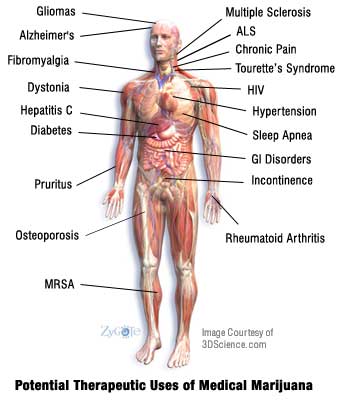First isolated by scientists in 1964, THC was later discovered to act within the natural cannabinoid system of the human body – the endocannabinoid system – in order to elicit its effects.

THC has a wide variety of effects on its user, affecting both the mind and body. Not only is THC responsible for many of the medicinal effects of marijuana, but it is also the chemical that causes users to feel “high” after ingesting marijuana.
Natural Occurrence
THC is produced naturally by the flowers of the female Cannabis plant and is just one of over 60 cannabinoids that are produced. The levels of THC contained in each plant vary according to strain. While some strains of marijuana like hemp have almost no THC at all, others have been selectively bred in order to achieve THC levels as high as 25%.
Cannabidiol (CBD) is another commonly known cannabinoid that is found in marijuana. Medical marijuana strains are frequently labelled with both THC and CBD levels, as both cannabinoids elicit their own unique effects on their users.
Short-term Effects of THC
Although cannabinoid receptors are found throughout the human body, THC acts mostly on the receptors found within the brain. This is why THC has such strong psychoactive properties and is closely associated with the “high” that marijuana users experience.
Along with feelings of euphoria, THC has also been reported to induce relaxation, alteration of sights, sounds and tastes, fatigue and increased appetite.
Medical Properties of THC
Extensive research over the past few decades has found THC to possess numerous medical properties that are beneficial in a wide range of disorders, some of which include:
- Alzheimer’s Disease
- Atherosclerosis
- Glaucoma
- Multiple sclerosis
- Parkinson’s Disease
- Sleep apnea
- Tourette Syndrome
- Cancer (various forms)
- and many more…
THC also has antiemetic (anti-nausea) properties, which makes it useful for treating AIDS and chemotherapy patients.
Marinol® – a pure THC pill – is legal for medical use and is available for patients in certain countries such as Canada, United States and Germany. However, patients have reported feeling too intoxicated from Marinol®, likely because of the lack of other cannabinoids which naturally occur in the Cannabis plant and help to mitigate the psychoactive effects of THC. Newer cannabinoid-based medications are being developed to include other medicinal cannabinoids such as CBD (cannabidiol) in hopes of maximizing medical potential and reducing adverse side-effects.
Toxicity
Although the toxicity level of THC has never been tested on humans, animal studies have demonstrated it to be remarkably non-toxic. Studies involving small animals such as rats have shown that a tremendous amount of THC (around 1000mg/kg) must be administered in order for death to occur. Other studies involving larger animals failed to result in death even when doses of THC of up to 3000mg/kg were administered.
Not a single case of human death by THC overdose has ever been documented.
Long-term Effects of THC
Studies documenting the long-term effects of THC intake have had varied and inconsistent results. Although highly debated, certain studies have found long-term use to result in the following negative side-effects:
- Short-term memory loss
- Lower mental aptitude scores
- Higher rates of psychosis and schizophrenia
However, there has yet to be any conclusive evidence of any negative long-term effects associated with THC intake.
Source: truthonpot.com